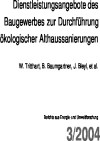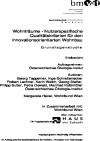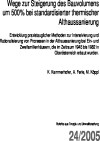Suchergebnisse
Info-Veranstaltung: Universitätslehrgang "Nachhaltiges Bauen", Zertifikat und Master
5. September 2013
Beginn: 17.00 Uhr
Technische Universität Wien
1040 Wien, AT
An diesem Informationsabend erhalten Sie nicht nur einen Überblick über den Lehrgang und seine Optionen, sondern es stehen Ihnen wissenschaftliche und organisatorische Leitung für Ihre ganz persönlichen Fragen zur Verfügung.
Workshop: Energie- und Gebäudelösungen aus Österreich - Chancen im Arabischen Raum
12. Juni 2014, 12:30 - 17:00 Uhr
Festsaal bmvit, Radetzkystraße 21030 Wien, AT
Die Veranstaltung ist Teil der Workshop-Reihe Haus der Zukunft in der Praxis und thematisierte die Umsetzung von Forschungs- und Entwicklungsergebnissen im Bereich der Energie- und Gebäudetechnologien in die Praxis.
Info-Veranstaltung: Innovative Baustoffe und deren Einsatz in Sanierung und Neubau
8. November 2012
Gewerbehaus der Wirtschaftskammer WienRudolf-Sallinger-Platz 1, 1030 Wien, AT
Informationsveranstaltung für Unternehmen (anschließend Netzwerken bei Ausstellung und Buffet)
Info-Veranstaltung: Universitätslehrgang "Nachhaltiges Bauen", Zertifikat und Master
5. Dezember 2013
Beginn: 17.00 Uhr
Technische Universität Wien
1040 Wien, AT
An diesem Informationsabend erhalten Sie nicht nur einen Überblick über den Lehrgang und seine Optionen, sondern es stehen Ihnen wissenschaftliche und organisatorische Leitung für Ihre ganz persönlichen Fragen zur Verfügung.
Dienstleistungsangebote des Baugewerbes zur Durchführung ökologischer Althaussanierungen

Schriftenreihe
03/2005
W. Tritthart, B. Baumgartner, J. Bleyl, et al.
Deutsch, 345 Seiten
Downloads zur Publikation
Wohnträume - Nutzerspezifische Qualitätskriterien für den innovationsorientierten Wohnbau

Schriftenreihe
21/2001
G. Tappeiner, I. Schrattenecker, R. Lechner, et.al.
Deutsch, 61 Seiten
Downloads zur Publikation
Tagung: Benutzerfreundliche Heizungssysteme für Passiv- Und Niedrigeenergiehäuser
17. Jun 2003
Forum KlosterGleisdorf, AT
Bewertung unterschiedlicher Heizungs- und Lüftungssysteme für Passiv- und Niedrigenergiehäuser unter Berücksichtigung von Raumklima, mögliche Bandbreite des Benutzerverhaltens, Endenergie- und Primärenergiebedarf, Kosten, Platzbedarf und Fehlerfreundlichkeit bei Installation und Betrieb.
Transferprojekt: Professioneller Strohbau konkret - "Virtuelle Baustelle", Ausstellung und Schulungsunterlagen
Strohballenbau-Workshops gelten als bestes Vermittlungsinstrument für diese ökologische Bauweise. Die "virtuelle Baustelle" weist dabei einige entscheidende Vorteile gegenüber der gängigen Praxis auf: Sie ist witterungsunabhängig, erlaubt die theoretische und praktische Beschäftigung mit unterschiedlichen Strohbautechniken und kann als ständige Einrichtung auch als Ausstellung genützt werden.
Sanierung mit Passivhaustechnologie vom Baumeister - abgesicherte Planungsunterlagen - Handbuch und Seminare
Projektziel ist die verstärkte Anwendung von Passivhaustechnologien durch den planenden, wie auch den ausführenden Baumeister in der Sanierung.
Info-Veranstaltung: Österreichische EUROSOLAR-Preisverleihung 2009 in Großschönau
10. Okt 2009
Großschönau, AT
Der Österreichische EUROSOLAR-Preis wird heuer bereits zum 16. Mal an Gemeinden, Unternehmen, Privatpersonen, Architekten, Organisationen, etc. mit besonderen Leistungen rund um die Nutzung von Erneuerbarer Energie verliehen.
Verringerung des Energieeinsatzes im "Haus der Zukunft" durch Nutzung innovativer Informationstechnologien

Im Rahmen des Projekts werden Möglichkeiten untersucht, durch Fernkontakt der Bewohnerinnen und Bewohner über Mobiltelefon und/oder Internet unter Berücksichtigung der Möglichkeiten der "Location Awareness" (z. B. GPS), den Energieeinsatz im "Haus der Zukunft" zu verringern. Dies betrifft vor allem die Möglichkeit der Temperaturabsenkung von Raumluft und Warmwasser während der Abwesenheit der Bewohnerinnen und Bewohner
Developing of a cost-efficient, energy-optimized window, built of wood and ecological insulating materials

Development of a sustainable windowconstruction using solar energy and ecogical materials.
Wege zur Steigerung des Bauvolumens um 500% bei standardisierter thermischer Althaussanierung

Entwicklung praxistauglicher Methoden zur Intensivierung und Rationalisierung von Prozessen in der Althaussanierung bei Ein- und Zweifamilienhäusern, die im Zeitraum 1945 bis 1982 in Oberösterreich erbaut wurden
Schriftenreihe
24/2005
K. Kammerhofer, A. Ferle, M. Köppl
Deutsch, 114 Seiten
Downloads zur Publikation
Tri 2014 - Internationales Symposium für energieeffiziente Architektur in Vorarlberg
8. - 10. Mai 2014
Festspiel- und Kongresshaus, Platz der Wiener Symphoniker 6900 Bregenz, AT
Was haben wir gelernt? Bauen, Energieeffizienz und Weisheit
Workshop: Optimierung von thermischen Solarsystemen im Geschoßwohnbau und Tourismus
7. Dec 2007
Energieinstitut Vorarlberg, Stadtstrasse 33
6850 Dornbirn, AT
Optimierung von thermischen Solarsystemen im Mehrfamilienhaus sowie dem Hotel- und Gastgewerbe
ProKlim - Optimisation of Energy Efficiency of automated indoor climate systems by using weather forecasts
Investigation of the basic energy savings potential for buildings in commercial use by including weather forecasts as a variable. Additionally, a concept for integrating weather forecasts into the heating and air conditioning control systems in buildings is planned to be developed. Within the scope of the feasibility study, a detailed analysis of technological possibilities, including both hardware and software, will be conducted.
SURO - The urban underground as mine? Potential of secondary resources in subsurface infrastructure systems
Feasibility of a resource cadaster to inventorize, characterize and locate material stocks in subsurface infrastructure networks. The results are used for the economic assessment of secondary resource potentials.
SQUARE - A System for Quality Assurance when Retrofitting Existing Buildings to Energy Efficient Buildings
The project aims to promote a flexible quality assurance management for the retrofitting process. It leads to high quality renovations of residential multifamily buildings regarding energy improvement and improvement of indoor environment.
IÖB-Tools: Bewertungsinstrumente für die innovationsfördernde öffentliche Beschaffung (IÖB)
Die IÖB-Tools stehen AnwenderInnen frei zum Download zur Verfügung. Sie bieten v.a. hinsichtlich Innovations- und Risikobewertung, Hilfestellung bei der BestbieterInnenauswahl und einen Fragebogen zur Evaluierung von Beschaffungsvorgängen auf kommunaler Ebene.
Grundlagenforschung zu Glasschaumgranulatschüttungen als lastabtragender und wärmedämmender Baustoff
Ziel des Forschungsvorhabens war es, die Eigenschaften von Glasschaumgranulat als lastabtragende und zugleich wärmedämmende Schicht unter lastabtragenden Bauteilen wissenschaftlich zu untersuchen, um so für das Gebäude der Zukunft einen multifunktionellen, kostengünstigen und vielfältig einsetzbaren Dämmstoff im Gründungsbereich zur Verfügung stellen zu können.
